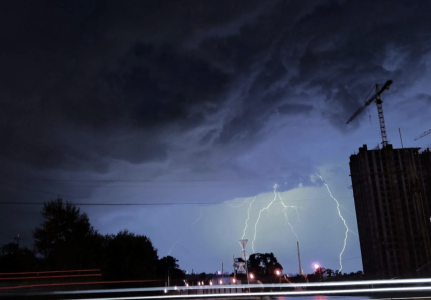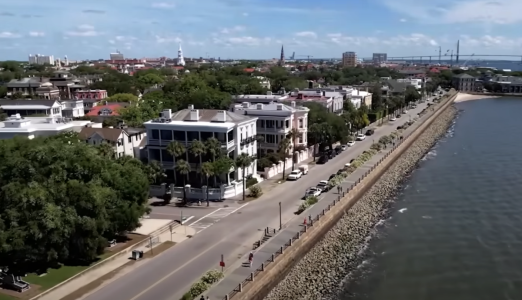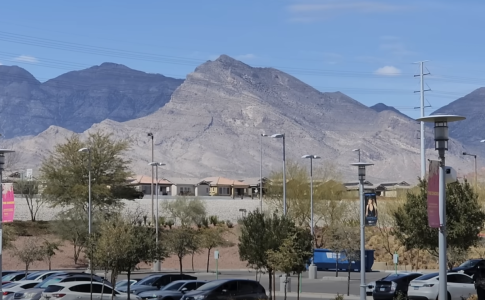Thinking of moving? These 11 cities may have weather risks you’ll want to consider
By
Veronica E.
- Replies 0
Retirement is often imagined as a peaceful, carefree chapter—one where you can slow down, explore your interests, and enjoy the rewards of a lifetime of work.
You might picture afternoons on a sunny porch, strolls through a lively downtown, or simply having the freedom to plan each day as you wish.
But with weather patterns shifting and extreme events becoming more common, some locations may not offer the comfort and security you expect.
Hurricanes, floods, wildfires, and prolonged heatwaves are increasingly shaping the safety and livability of certain cities, which is important to consider before making a big move.
At The GrayVine, we believe retirement planning means preparing for the unexpected as much as for the dream scenarios.
If you’re considering a move, here’s a closer look at 11 US cities AARP says could face extreme weather that might complicate—or even derail—your retirement plans.

A rainy afternoon or a light snowfall is one thing, but today’s extreme weather events can mean far more serious issues.
We’re talking about major power outages, significant property damage, higher insurance costs, and interruptions to essential services.
For retirees, especially those managing health conditions or mobility concerns, these disruptions can pose real safety risks rather than just inconveniences.
1. Miami, Florida
2. Houston, Texas
3. Phoenix, Arizona
4. New Orleans, Louisiana
5. Los Angeles, California
6. Charleston, South Carolina

7. Tampa, Florida
8. Las Vegas, Nevada

9. Oklahoma City, Oklahoma
10. San Juan, Puerto Rico
11. San Francisco, California
Climate change is a driving force behind these patterns.
Warmer ocean temperatures fuel stronger hurricanes, higher global temperatures mean more frequent and severe heatwaves, and shifting climate conditions make droughts and wildfires harder to control.
That “perfect” climate that may have drawn retirees in years past could be less predictable and more hazardous today.
For retirees, the effects of extreme weather extend beyond inconvenience.
Insurance premiums can rise sharply—or coverage may become harder to obtain.
Home values can drop in high-risk areas, and health threats like heat-related illness, respiratory problems from wildfire smoke, or storm-related injuries are more likely to affect older adults.
If you’re looking for mild weather and lower risk, consider places like Asheville, North Carolina; Madison, Wisconsin; or Eugene, Oregon.
These cities often rank high for their mix of livability, culture, and environmental safety.
Retirement is about enjoying your time, your hobbies, and your community—not worrying about the next storm or heatwave.
By staying informed and considering both the beauty and the risks of a location, you can choose a place that truly supports your golden years.
Read next: A powerful new heat dome is sweeping in—how hot could your area get?

Have weather risks ever influenced where you plan to retire, or are you already living in one of these high-risk cities? Share your experience in the comments!
You might picture afternoons on a sunny porch, strolls through a lively downtown, or simply having the freedom to plan each day as you wish.
But with weather patterns shifting and extreme events becoming more common, some locations may not offer the comfort and security you expect.
Hurricanes, floods, wildfires, and prolonged heatwaves are increasingly shaping the safety and livability of certain cities, which is important to consider before making a big move.
At The GrayVine, we believe retirement planning means preparing for the unexpected as much as for the dream scenarios.
If you’re considering a move, here’s a closer look at 11 US cities AARP says could face extreme weather that might complicate—or even derail—your retirement plans.

Some popular retirement spots face growing threats from extreme weather, prompting many to rethink their plans. Image Source: Pexels / Кирилл Loveloonies.
Why weather matters in retirement
A rainy afternoon or a light snowfall is one thing, but today’s extreme weather events can mean far more serious issues.
We’re talking about major power outages, significant property damage, higher insurance costs, and interruptions to essential services.
For retirees, especially those managing health conditions or mobility concerns, these disruptions can pose real safety risks rather than just inconveniences.
11 cities to think twice about
1. Miami, Florida
- Main concerns: Hurricanes, flooding, rising sea levels.
- Reality check: Miami’s beaches are beautiful, but hurricane season is longer and more intense than in decades past. “Sunny day” flooding, where water covers streets even without rain, now affects some neighborhoods.
2. Houston, Texas
- Main concerns: Hurricanes, flooding, extreme heat.
- Reality check: Hurricanes like Harvey have left a lasting impact here. The city’s flat landscape makes flooding more likely, and summers bring increasingly frequent and dangerous heatwaves.
Also read: Weather alerts return in multiple languages after brief pause—here’s why it matters
3. Phoenix, Arizona
- Main concerns: Extreme heat, drought.
- Reality check: Phoenix’s sunny climate comes with long stretches of triple-digit temperatures. Ongoing drought conditions and the risk of wildfires add to the challenges.
4. New Orleans, Louisiana
- Main concerns: Hurricanes, flooding.
- Reality check: The city’s charm is world-famous, but its location below sea level makes it highly vulnerable to hurricanes and severe flooding.
Also read: Cold weather myths exposed—what’s actually making you sick
5. Los Angeles, California
- Main concerns: Wildfires, drought, earthquakes.
- Reality check: While the climate is often pleasant, wildfire risks and water shortages have grown. The ever-present possibility of earthquakes is another factor to keep in mind.
6. Charleston, South Carolina
- Main concerns: Hurricanes, flooding.
- Reality check: Historic beauty aside, Charleston has seen more frequent and severe storms in recent years, with flooding now a regular part of life for many neighborhoods.

Charleston’s historic charm comes with a growing challenge—more frequent flooding and stronger storms are becoming part of daily life. Image Source: YouTube / Matt O'Neill Real Estate - Charleston, SC.
Also read: Homeowners can save up to $83 a year with this simple “weather strip” trick—and it works year-round
7. Tampa, Florida
- Main concerns: Hurricanes, flooding.
- Reality check: Sitting on the Gulf Coast, Tampa faces significant hurricane and storm surge risks.
8. Las Vegas, Nevada
- Main concerns: Extreme heat, water scarcity.
- Reality check: Heatwaves regularly break records here, and limited water supplies are becoming a pressing concern for long-term residents.

Las Vegas offers bright lights and endless entertainment, but residents face rising concerns over extreme heat and dwindling water supplies. Image Source: YouTube / Travel Ruby.
Also read: Brace yourself! Extreme storms are sweeping the nation—are YOU in the danger zone?
9. Oklahoma City, Oklahoma
- Main concerns: Tornadoes, severe storms.
- Reality check: Located in Tornado Alley, the city regularly experiences some of the country’s most violent and unpredictable storms.
10. San Juan, Puerto Rico
- Main concerns: Hurricanes, power outages.
- Reality check: Hurricanes can leave much of the island without power and water for extended periods—weeks, in some cases.
11. San Francisco, California
- Main concerns: Wildfires, drought, earthquakes.
- Reality check: While less directly affected by wildfires, surrounding areas are vulnerable. Drought and earthquake risk remain concerns for residents.
Also read: Catastrophic tornadoes strike—are you prepared for the next one?
Why the risk is growing
Climate change is a driving force behind these patterns.
Warmer ocean temperatures fuel stronger hurricanes, higher global temperatures mean more frequent and severe heatwaves, and shifting climate conditions make droughts and wildfires harder to control.
That “perfect” climate that may have drawn retirees in years past could be less predictable and more hazardous today.
The hidden costs of extreme weather
For retirees, the effects of extreme weather extend beyond inconvenience.
Insurance premiums can rise sharply—or coverage may become harder to obtain.
Home values can drop in high-risk areas, and health threats like heat-related illness, respiratory problems from wildfire smoke, or storm-related injuries are more likely to affect older adults.
Also read: New headlines show the Trump administration is steering climate policy in a new direction
How to prepare or choose wisely
- Do your research: Look into FEMA flood maps, climate reports, and local weather history before committing to a move.
- Seek resilient communities: Prioritize areas with strong infrastructure, emergency services, and community preparedness programs.
- Factor in healthcare access: In emergencies, proximity to medical care can be critical.
- Have an emergency plan: If you already live in a higher-risk area, make sure you have a stocked emergency kit, a family communication plan, and clear evacuation routes.
Safer alternatives to explore
If you’re looking for mild weather and lower risk, consider places like Asheville, North Carolina; Madison, Wisconsin; or Eugene, Oregon.
These cities often rank high for their mix of livability, culture, and environmental safety.
Retirement is about enjoying your time, your hobbies, and your community—not worrying about the next storm or heatwave.
By staying informed and considering both the beauty and the risks of a location, you can choose a place that truly supports your golden years.
Read next: A powerful new heat dome is sweeping in—how hot could your area get?
Key Takeaways
- A new report identifies 11 US cities where extreme weather risks are rising, posing challenges for retirees.
- Common hazards include hurricanes, flooding, extreme heat, drought, wildfires, and tornadoes.
- Such risks can increase insurance costs, reduce property values, and create health and safety issues for older residents.
- Experts advise researching climate safety, infrastructure, and emergency services before relocating for retirement.
Have weather risks ever influenced where you plan to retire, or are you already living in one of these high-risk cities? Share your experience in the comments!






